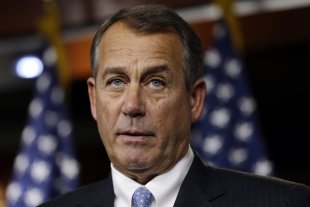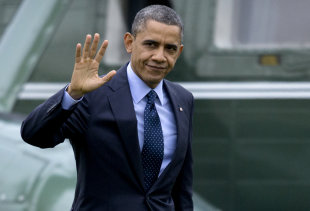WASHINGTON (AP) — With steroids easy to buy, testing weak and punishments inconsistent, college football players are packing on significant weight — 30 pounds or more in a single year, sometimes — without drawing much attention from their schools or the NCAA in a sport that earns tens of billions of dollars for teams.
Rules vary so widely that, on any given game day, a team with a strict no-steroid policy can face a team whose players have repeatedly tested positive.
An investigation by The Associated Press — based on interviews with players, testers, dealers and experts and an analysis of weight records for more than 61,000 players — revealed that while those running the multibillion-dollar sport say they believe the problem is under control, that control is hardly evident.
The sport's near-zero rate of positive steroids tests isn't an accurate gauge among college athletes. Random tests provide weak deterrence and, by design, fail to catch every player using steroids. Colleges also are reluctant to spend money on expensive steroid testing when cheaper ones for drugs like marijuana allow them to say they're doing everything they can to keep drugs out of football.
"It's nothing like what's going on in reality," said Don Catlin, an anti-doping pioneer who spent years conducting the NCAA's laboratory tests at UCLA. He became so frustrated with the college system that it was part of the reason he left the testing industry to focus on anti-doping research.
___
EDITOR'S NOTE — Whether for athletics or age, Americans from teenagers to baby boomers are trying to get an edge by illegally using anabolic steroids and human growth hormone, despite well-documented risks. This is the first of a two-part series.
___
While other major sports have been beset by revelations of steroid use, college football has operated with barely a whiff of scandal. Between 1996 and 2010 — the era of Barry Bonds, Mark McGwire, Marion Jones and Lance Armstrong — the failure rate for NCAA steroid tests fell even closer to zero from an already low rate of less than 1 percent.
The AP's investigation, drawing upon more than a decade of official rosters from all 120 Football Bowl Subdivision teams, found thousands of players quickly putting on significant weight, even more than their fellow players. The information compiled by the AP included players who appeared for multiple years on the same teams.
For decades, scientific studies have shown that anabolic steroid use leads to an increase in body weight. Weight gain alone doesn't prove steroid use, but very rapid weight gain is one factor that would be deemed suspicious, said Kathy Turpin, senior director of sport drug testing for the National Center for Drug Free Sport, which conducts tests for the NCAA and more than 300 schools.
Yet the NCAA has never studied weight gain or considered it in regard to its steroid testing policies, said Mary Wilfert, the NCAA's associate director of health and safety.
The NCAA attributes the decline in positive tests to its year-round drug testing program, combined with anti-drug education and testing conducted by schools.
The AP's analysis found that, regardless of school, conference and won-loss record, many players gained weight at exceptional rates compared with their fellow athletes and while accounting for their heights.
Adding more than 20 or 25 pounds of lean muscle in a year is nearly impossible through diet and exercise alone, said Dan Benardot, director of the Laboratory for Elite Athlete Performance at Georgia State University.
In nearly all the rarest cases of weight gain in the AP study, players were offensive or defensive linemen, hulking giants who tower above 6-foot-3 and weigh 300 pounds or more. Four of those players interviewed by the AP said that they never used steroids and gained weight through dramatic increases in eating, up to six meals a day. Two said they were aware of other players using steroids.
"I ate 5-6 times a day," said Clint Oldenburg, who played for Colorado State starting in 2002 and for five years in the NFL. Oldenburg's weight increased over four years from 212 to 290.
Oldenburg told the AP he was surprised at the scope of steroid use in college football, even in Colorado State's locker room. "There were a lot of guys even on my team that were using." He declined to identify any of them.
The AP found more than 4,700 players — or about 7 percent of all players — who gained more than 20 pounds overall in a single year. It was common for the athletes to gain 10, 15 and up to 20 pounds in their first year under a rigorous regimen of weightlifting and diet. Others gained 25, 35 and 40 pounds in a season. In roughly 100 cases, players packed on as much 80 pounds in a single year.
In at least 11 instances, players that AP identified as packing on significant weight in college went on to fail NFL drug tests. But pro football's confidentiality rules make it impossible to know for certain which drugs were used and how many others failed tests that never became public.
Even though testers consider rapid weight gain suspicious, in practice it doesn't result in testing. Ben Lamaak, who arrived at Iowa State in 2006, said he weighed 225 pounds in high school. He graduated as a 320-pound offensive lineman and said he did it all naturally.
"I was just a young kid at that time, and I was still growing into my body," he said. "It really wasn't that hard for me to gain the weight. I love to eat."
In addition to random drug testing, Iowa State is one of many schools that have "reasonable suspicion" testing. That means players can be tested when their behavior or physical symptoms suggest drug use. Despite gaining 81 pounds in a year, Lamaak said he was never singled out for testing.
The associate athletics director for athletic training at Iowa State, Mark Coberley, said coaches and trainers use body composition, strength data and other factors to spot suspected cheaters. Lamaak, he said, was not suspicious because he gained a lot of "non-lean" weight.
But looking solely at the most significant weight gainers also ignores players like Bryan Maneafaiga.
In the summer of 2004, Bryan Maneafaiga was an undersized 180-pound running back trying to make the University of Hawaii football team. Twice — once in pre-season and once in the fall — he failed school drug tests, showing up positive for marijuana use but not steroids.
He'd started injecting stanozolol, a steroid, in the summer to help bulk up to a roster weight of 200 pounds. Once on the team, he'd occasionally inject the milky liquid into his buttocks the day before games.
"Food and good training will only get you so far," he told the AP recently.
Maneafaiga's former coach, June Jones, said it was news to him that one of his players had used steroids. Jones, who now coaches at Southern Methodist University, believes the NCAA does a good job rooting out steroid use.
On paper, college football has a strong drug policy. The NCAA conducts random, unannounced drug testing and the penalties for failure are severe. Players lose an entire year of eligibility after a first positive test. A second offense means permanent ineligibility for sports.
In practice, though, the NCAA's roughly 11,000 annual tests amount to a fraction of all athletes in Division I and II schools. Exactly how many tests are conducted each year on football players is unclear because the NCAA hasn't published its data for two years. And when it did, it periodically changed the formats, making it impossible to compare one year of football to the next.
Even when players are tested by the NCAA, experts like Catlin say it's easy enough to anticipate the test and develop a doping routine that results in a clean test by the time it occurs. NCAA rules say players can be notified up to two days in advance of a test, which Catlin says is plenty of time to beat a test if players have designed the right doping regimen. By comparison, Olympic athletes are given no notice.
Most schools that use Drug Free Sport do not test for anabolic steroids, Turpin said. Some are worried about the cost. Others don't think they have a problem. And others believe that since the NCAA tests for steroids their money is best spent testing for street drugs, she said.
Doping is a bigger deal at some schools than others.
At Notre Dame and Alabama, the teams that will soon compete for the national championship, players don't automatically miss games for testing positive for steroids. At Alabama, coaches have wide discretion. Notre Dame's student-athlete handbook says a player who fails a test can return to the field once the steroids are out of his system.
The University of North Carolina kicks players off the team after a single positive test for steroids. Auburn's student-athlete handbook calls for a half-season suspension for any athlete caught using performance-enhancing drugs.
At UCLA, home of the laboratory that for years set the standard for cutting-edge steroid testing, athletes can fail three drug tests before being suspended. At Bowling Green, testing is voluntary.
At the University of Maryland, students must get counseling after testing positive, but school officials are prohibited from disciplining first-time steroid users.
Only about half the student athletes in a 2009 NCAA survey said they believed school testing deterred drug use. As an association of colleges and universities, the NCAA could not unilaterally force schools to institute uniform testing policies and sanctions, Wilfert said.
"We can't tell them what to do, but if went through a membership process where they determined that this is what should be done, then it could happen," she said.
___
Associated Press writers Ryan Foley in Cedar Rapids, Iowa; David Brandt in Jackson, Miss.; David Skretta in Lawrence, Kan.; Don Thompson in Sacramento, Calif., and Alexa Olesen in Shanghai, China, and researchers Susan James in New York and Monika Mathur in Washington contributed to this report.
___
Contact the Washington investigative team at DCinvestigations (at) ap.org.
Whether for athletics or age, Americans from teenagers to baby boomers are trying to get an edge by illegally using anabolic steroids and human growth hormone, despite well-documented risks. This is the first of a two-part series.




